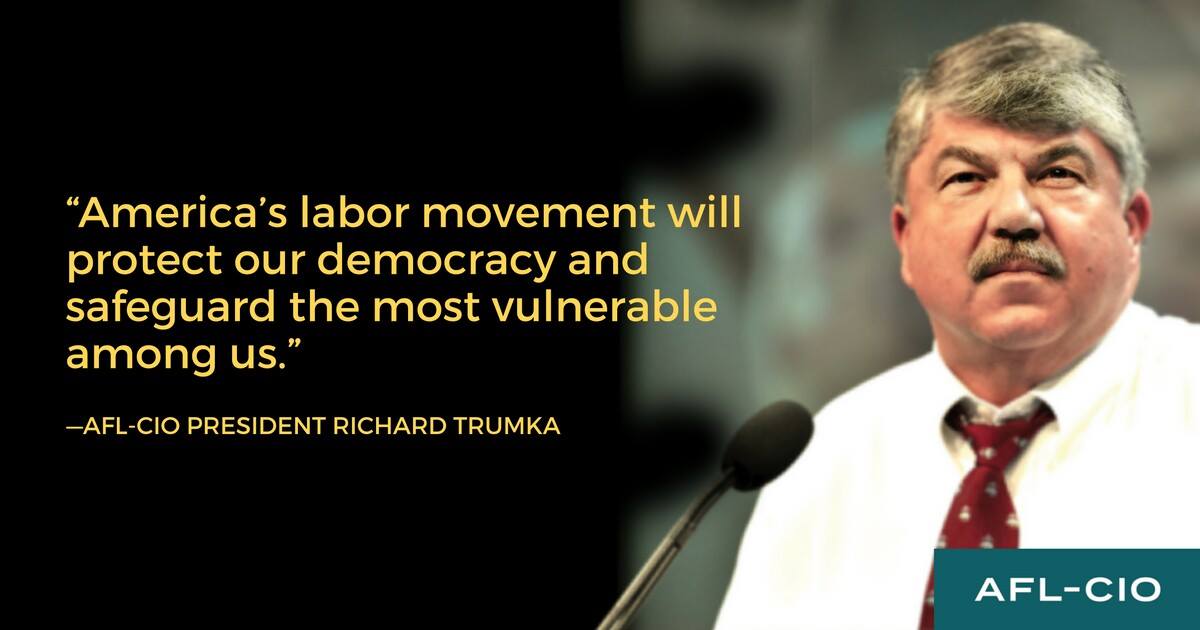

Share
Widening income inequality, in the United States and in other developed nations, threatens democracy, just as it did in the 1930s, AFL-CIO President Richard Trumka says.
Trumka issued that warning in early June at the Organization for Economic Cooperation and Development meeting in Paris. The OECD, which represents the most-developed nations in the world, invited outside experts to discuss the state of the world economy.
The AFL-CIO leader tied it to the state of world democracy.
“Please, please understand, the alternative to addressing wage stagnation and the status of working people in the global economy is not more of the same elite-dominated globalization. The alternative is an escalating crisis where the false promises of authoritarianism and racism threaten to overwhelm the democratic ideal,” he said.
Trumka did not name names of authoritarians on the rise, but political scientists cite French presidential candidate Marine LePen, right-wing political parties in Europe, and Russian President Vladimir Putin as examples. Some cite authoritarian tendencies in U.S. President Donald Trump. The real problem, Trumka said, is the system’s tilt against workers.
“Globalization has meant rising inequality,” whose cause “turns out to be the decline in workers’ share of income and wages not keeping up with productivity,” he explained.
That decline is due to “the decline in workers’ bargaining power as a result of globalization being managed in ways that pit workers against each other. Underneath all of this is the decline of the percentage of workers belonging to unions and covered by collective bargaining…This is not my explanation. This is what the OECD says in” its economic outlook.
And since the yawning gap between the rich and the rest of us is worldwide, it demands worldwide policy solutions to “the root causes of this low (income) growth.” Added Trumka: “Stop trying to marginalize the crisis of low wages and stagnant growth as merely regional, or treat it as if it were somehow inevitable rather than being the product of policy choices.”
But OECD and its member nations haven’t changed their policies, he chided. They still “make excuses” for the income gap. And OECD still issues “recommendations to weaken collective bargaining, lower the minimum wage and weaken unemployment insurance — exactly the policies that produced the serious economic and political crisis we now face. This schizophrenia really must stop if we are to solve” it.
If the OECD nations, including the U.S., don’t reverse those policies, democracy is endangered because its economic underpinning is endangered, he warned.
“Anti-democratic forces are able to gain ground fundamentally because ordinary people believe democracy has come to mean inequality, poverty, and rising economic insecurity. A recent Harvard University public opinion study found only 30 percent of Americans born since 1980 think democracy is necessary for a good society, and 24 percent think democracy is harmful.
“This is precisely why we must not allow the policy debate to become one between neoliberals and authoritarians. We must have a humane economic vision AND a human political vision. That requires rebuilding the collective power of working people, both in the workplace and in politics,” Trumka said.
“In a world of global corporations and big data, of Nissan and Uber, collective power is the only form of empowerment that actually exists for ordinary people.”
The OECD ministers, meeting in Paris, agreed with Trumka on the widening gap between the rich and the rest. But they said globalization and technological change cause it.
They also didn’t mention its threat to democracy or to workers. And they didn’t endorse worker power – through unionization or any other way – as part of their package of solutions. Instead, they said OECD nations, including the U.S., should enact “policies that support skills, innovation, long-term investment and inclusive growth.”

